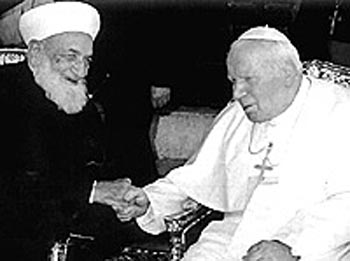Monday, April 13, 2015
Why the Crusades were necessary. No Islam, no Jihad, no necessity for the Crusades.
The theological fascism named Submission, caused the Crusades.
by Martin T. Horvat, Phd
Modern history’s judgment on the Crusades has been severe and myopic, set as it is on portraying this glorious episode of Christian history as morally evil. When I praise the Middle Ages, I sometimes have young Catholics defiantly respond, “All right, all right. But how do you justify the Crusades?” Indoctrinated by revisionist history books and inter-religious study courses, they have accepted the false verdict that the Crusades were nothing more than a condemnable act of intolerance in the name of God.
Further, many of these youth have been adversely influenced by innumerable apologies for the Crusades from so many high-placed Catholic Prelates, religious, and educators of the post-Vatican II progressivist Church. Let me give only a few examples:
* During a visit to Syria this year (2001), Pope John Paul II himself visited a mosque and asked forgiveness of the Muslims “for Christian offenses and violence of the past” (1)
* On July 15, 1999, the 900th anniversary of the fall of Jerusalem to the Crusaders, a party of Christians, claiming to be acting in the name of Christ and as supposed descendents of Crusaders, paraded round the wall of the Old City to publicize a personal apology to Muslims for the Crusades (2).
This small incident says a lot: A new Catholic high school in San Juan Capistrano (CA) chose the team name Crusaders, only to have the name vetoed by the board because “it would be offensive to Muslims, who were targets of the bloody crusades of the Middle Ages “ (3).
To accept blame when one is at fault is, or course, good. But in the above cases, the apologizers and reconciliators only show that they have misinterpreted history.
First, they do not understand what motivated the West to a just war: The Crusades were waged to recover the Holy Sepulchre, which had become the target of constant profanation by the Muslims, for the defense of Christian pilgrims, and for the recovery of Christian territory. They constituted a defensive reaction against the Islamic threat.
Second, they do not understand the aggressive nature and fanaticism of Islam (founded by Mohammed, who lived from about 570 to 632 AD), which had been in conflict with Christianity since the Muslim conquests of the 7th century, and had as its goal the imposition of its religion and Mohammedan law on all Europe.
|
|
The anger, frustration and fear roused in all Americans at the September 11 attack on the East Coast provide an opportunity to make the Crusades more comprehensible. There are surprising parallels between the two events. Both then and now, there were:
1. the peril of losing valuable religious principles, such as freedom of worship;
2. a perceived physical threat to fellow countrymen;
3. the injury experienced at losing a landmark site;
4. the sense that what is at stake is nothing less than the survival of Western civilization.
Those who rant and rave against the Crusades may soon find the ground shifting beneath them as they share in a new consensus, which, at base, is not so different from that which supported the medieval religious war they are condemning. Today’s call for a war on moral grounds is not so different from that of the Pope who called on Christians throughout Europe to come to the defense of Christendom “out of love of God and their neighbor” (4).
4. Jonathan Riley-Smith, What were the Crusades? (London, 1977), pp. 13-14.
A threat to fellow Christians
Since the third century, a favorite site of pilgrimage for Christians was the Holy Land. When Islam burst out of Arabia and took control of the Middle East in the seventh century, pilgrimages to the Holy Land became more difficult, but never ceased.
But the great age of pilgrimage began with the 10th century. In Palestine, the most beloved site of pilgrimage, the lot of the Christians was no longer so bad, and men and women of every class and age, sometimes travelling in parties numbering thousands, journeyed by sea or the land route to visit “the Sepulchre of the Lord which is in Jerusalem.” The Fatimid Arabs who were governing Palestine were lenient, trade was prospering, and pilgrims were welcomed for the wealth they brought to the province.
This period of relative peace came to an abrupt halt at the end of the 10th century. The Arabs were displaced as governors of the holy places by the Seljuk Turks, who reinvigorated the dwindling military spirit of Islam, and again made the call for jihad, or holy war. Their aim was the same as it has been since the inception of Islam, which does not mean “peace,” despite the strange and insistent claims of this seen in the newspapers today.
In fact, the word Islam means submission, and not just a passive submission to the book of Islam, the Koran. Submission for the followers of Mohammed means to carry out the will of Allah in history. The Muslim doctrine of the jihad, or holy war, stemmed from the ideas of the prophet himself—that is, that it was Allah’s will for a permanent war to reign until the rule of Islam extended over all the world. Hence Islam’s political domination could be, and was, spread by the sword. This is why Hillaire Belloc predicted almost a century ago that the West could again see a threat from Islam:
“It very nearly destroyed us. It kept up the battle against Christendom actively for a thousand years, and the story is by no means over; the power of Islam may at any moment re-arise” (5).
5. Hillaire Belloc, The Great Heresies, Chapter Four
Site link where this was published by Martin T. Horvat, Phd.
